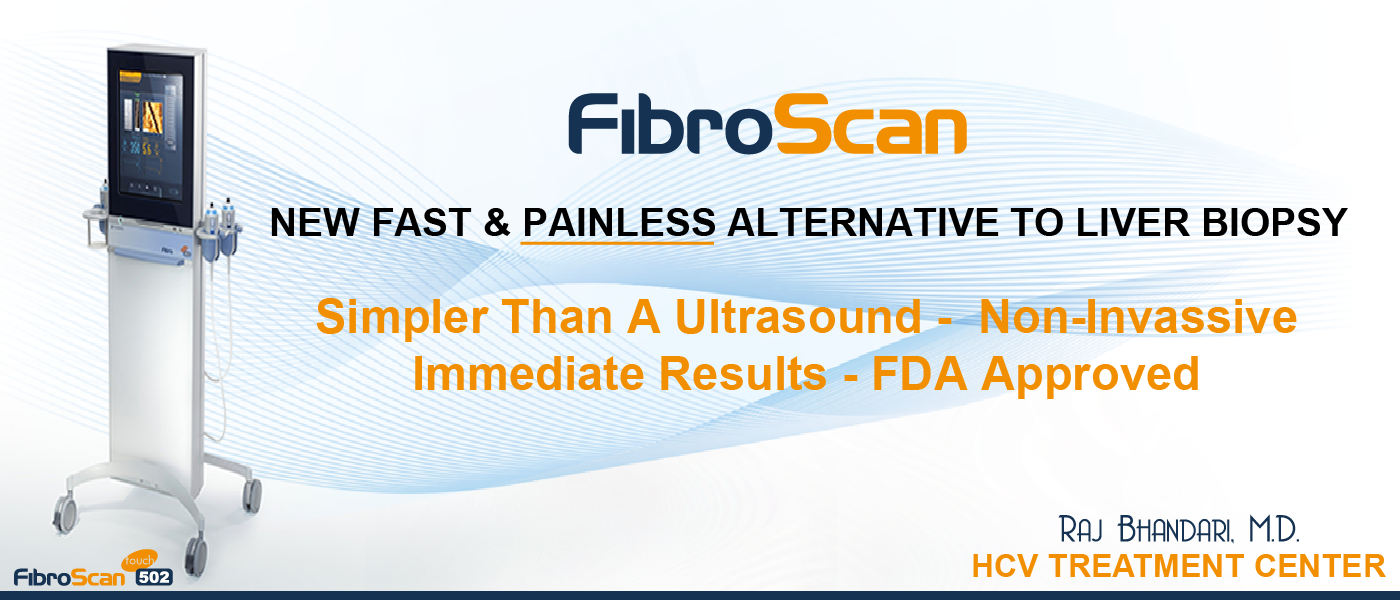
Understanding FibroScan
What is FibroScan?
Examination with FibroScan® (transient elastography) is a technique used to assess liver stiffness (measured in kPa correlated to fibrosis) without invasive investigation. The result is immediate, it shows the condition of the liver and allows physicians to diagnose and monitor disease evolution in conjunction with treatment and collateral factors. Exam results help to anticipate various complications, as well as to monitor and assess the damage caused by conditions such as cirrhosis.
The FibroScan examination is painless, quick and easy. During measurement, you feel a slight vibration on the skin at the tip of the probe.
For appointment call: 318 283-2177
What does the FibroScan examination consist of?
- You lie on your back, with your right arm raised behind your head. Physician applies a water-based gel to the skin and places the probe with a slight pressure
- The examination includes 10 consecutive measurements made at the same location
- The result is delivered at the end of the examination, it’s a number which can vary from 1.5 to 75 kPa. Your doctor will interpret the result
What preparation is required?
No food or drink for 3 hours, prior to the test.
What does the result mean?
Your physician interprets the result according to your history and underlying disease.
Who can prescribe the FibroScan® examination?
Your physician or hepatologist will indicate the most appropriate time for you to have the examination.
What difference does FibroScan make to me?
- Fibroscan provides immediate results
- It’s easy and fast (5-10 minutes)
- The exam is painless and non-invasive
- In case of close follow-up, the examination can be safely repeated
Why should you have a FibroScan examination?
FibroScan may help you get approval for the new Hepatitis C treatments. In many cases FibroScan can help you and your doctor avoid the added risk and possible complications of a liver biopsy
After a successful treatment,having a yearly FibroScan can monitor your liver's recovery. Recovery from liver fibrosis may lower your long term risk of cancer. FibroScan can show you how your recovery is advancing.
A FibroScan examination might be needed if you have any of the following conditions:
- Virus infections, such as Hepatitis B or Hepatitis C
- Alcohol related liver disease
- Obesity related liver disease (Non-alcoholic fatty liver disease)
- Other types of chronic liver disease
How FibroScan works
Fibroscan uses "shear waves" to measure the elasticity of the liver using an improved technique called Vibration-Controlled Transient Elastography. As the shear wave passes through the liver, it is affected by the amount of scarring (fibrosis), and this is interpreted to give an accurate global assessment of the stage of fibrosis (fibrosis staging).
The proper use of shear wave velocity analysis requires control of various physical parameters to ensure an accurate, reliable, and reproducible assessment of tissue stiffness, all inherent features incorporated into the Fibroscan. The stiffer the liver the more severe the fibrosis.
What is liver fibrosis and why detect it early?
Liver fibrosis is a condition of scarring and stiffness of the liver and is caused by a variety of medical conditions. The most advanced form of scarring is called cirrhosis.
Cirrhosis can result from long term liver infections or long term liver toxins in which the healthy liver tissues are slowly replaced by scar tissues. Initially the scar tissue is fine and delicate and difficult to detect but over time it becomes thicker and can start to strangle the liver. This can prevent the liver from functionally properly. This can lead to advanced, and often irreversible, liver failure. Patients with liver failure usually require a transplant. Avoidance of cirrhosis by early detection of fibrosis has been a challenge.
Routine test
Using the FibroScan® 502 device, we can now routinely provide this test to all patients who have or have had chronic conditions of the liver including those patients who previously underwent treatment.
For appointment call: 318 283-2177
FibroScan for HBV & HCV patients
Patients who live with viral hepatitis might not have any noticeable health problems for years. However, as the years progress, scarring in the liver can build up and slowly lead to liver failure. Once that stage is reached, the patient will need a liver transplant.
With the new FibroScan technology it is now easy to measure the health of the liver and see how much scarring the hepatitis virus has caused. Knowing the stage of fibrosis can help a patient decide if they need to start a treatment plan immediately.
Monitoring the progress of the liver disease
FibroScan® tests can be repeated regularly (e.g. every 6-12 months) without any health risks. This can help monitor the progression of a liver disease. If you are starting a treatment (e.g. for Hepatitis C), or are making lifestyle changes to lessen the severity of damage to your liver, a FibroScan will help monitor change.
Dr. Bhandari has staff privileges
at the following hospitals:

Monday, Wednesday
& every other Thursday

Tuesday & every
other Thursday

Every other Friday
Our Location:
Monday to Friday: 8:00 AM to 5:00 PM.
616 South Washington | Bastrop, LA 71220 | PH: 318 283-3990

